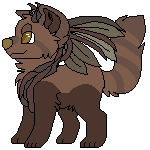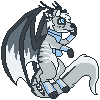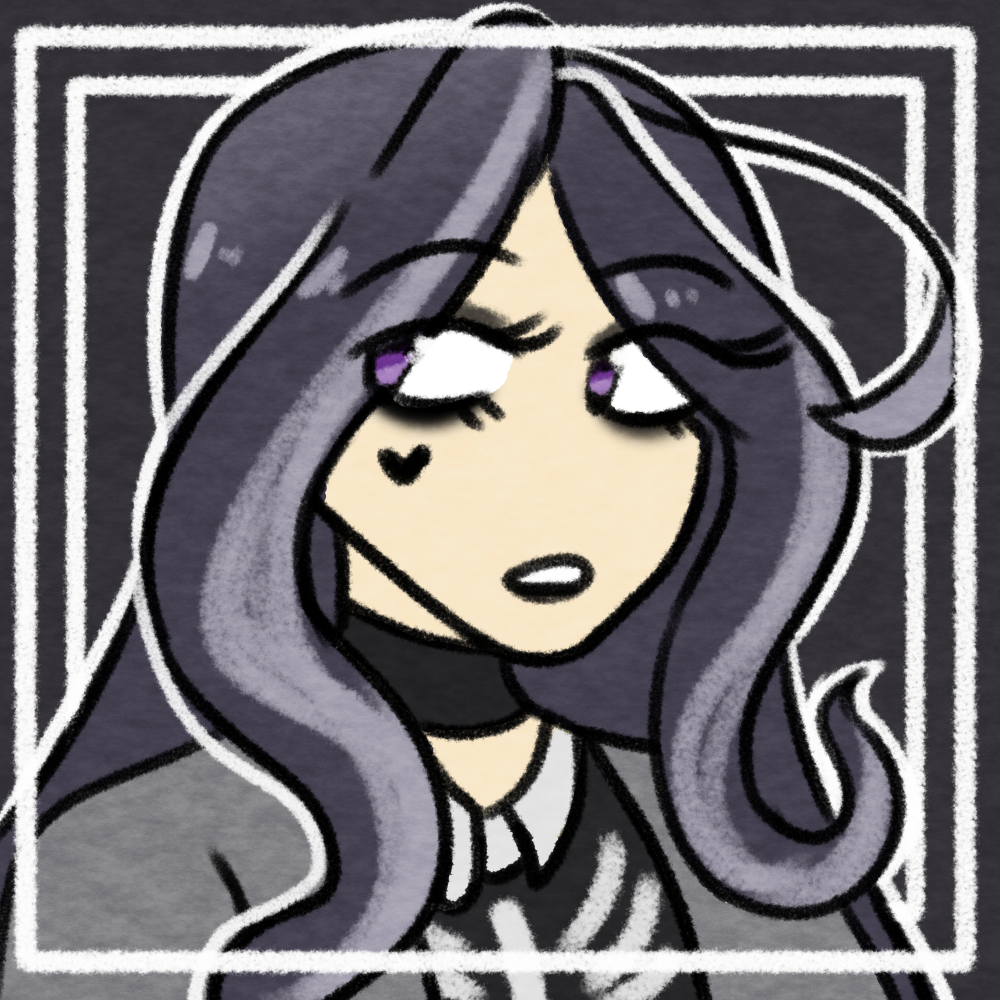Username: WolfWinter
Name: Jack Hallow
Gender: Male
Gender for breeding: Male
Their unique skill: Late one night, Jack learned he had a unique ability. When a spirit of death tried to devour him, demons from the shadows saved him. One in particular took a liking to him. His ability to summon this demon grows with every day. The demon calls itself Atlia. Through his bond with Atlia, he can summon other demons, and not just ones of the shadows.
Writing Extra: (Maximum 300 words)
Art Extra: (Animations and comics are not allowed)
WIP
40 posts
• Page 2 of 4 • 1, 2, 3, 4
-

WolfWinter - Posts: 1787
- Joined: Wed Mar 25, 2009 10:22 am
- My pets
- My items
- My wishlist
- My gallery
- My scenes
- My dressups
- Trade with me
-

Yuroshi - Posts: 3982
- Joined: Mon Dec 25, 2017 4:50 am
- My pets
- My items
- My wishlist
- My gallery
- My scenes
- My dressups
- Trade with me
Re: Viscet #2757
mark!! o:

hello !! i'm a little dead rn,
getting my life in order <: !
will be visiting back on
occasion <3
[ viscets ]
i'm a random art student who really likes animals

-

Xelinator - Posts: 8140
- Joined: Mon Feb 07, 2011 1:50 am
- My pets
- My items
- My wishlist
- My gallery
- My scenes
- My dressups
- Trade with me
Re: Viscet #2757
Username: ~Trompy
Name: Fireheart
Gender: Male
Gender for breeding: Male
Their unique skill:
Extra:
Name: Fireheart
Gender: Male
Gender for breeding: Male
Their unique skill:
700/700 words wrote:A viscling peered into a shop window, their interest piqued by the beautiful glass ornaments and sculptures lining it. Her eyes sparkled with curiosity as she examined the pieces, the wide range of colors and shapes leaving her with a million questions. Face and paws pressed against the glass, she spotted a viscet inside. She watched with an undivided attention as the viscet opened what looked to be a very hot oven, shoveling shards of clear glass and balls of white stuff into it. The viscling inched towards the door, taken over with a need to discover and learn.
The bell on the door alerted the worker of the viscling’s entry. Turning to greet the visitor, he smiled softly. “Come on in. I’m just about to make a vase.”
The spark of curiosity took over as the viscling fully entered the shop, the bell dinging again as the door swung close. She took a couple steps towards the worker, eyes wide. “A vase?”
The worker nodded. “Yeah. Like a pot, but tall enough to put flowers in.”
She watched in awe as the worker opened one of the ovens. The heat hit its little face from ten feet away, and this grown-up was less than a tail-tip from it! “How can you get so close to it?!” She asked in a squeaky voice.
The worker shrugged his shoulders, a small chuckle escaping him. “You get used to it.”
She came a step closer, watching as the worker stuck the rod into the heat. “What is it?”
“A melting furnace.” He swirled the tip of the rod in for a few seconds before pulling it back out. “It gets 2,200 degrees in there!”
“Wow!!” The viscling’s eyes moved to the end of the pole that had just been in the furnace. Now it had a glob of stuff on the end of it that was yellowish orange in appearance.
The worker smiled from ear to ear, beckoning the viscling closer with his tail, bringing it up close. He rolled it in some pink powder, and the viscling asked. “What’s that?”
“That’s actually finely ground glass.” He slipped the end of the pole back into the furnace for a few seconds. “Since the glass doesn’t have any color when we start, we have to add it.” She watched every movement he made like a hawk. “Now’s the fun part…” The worker pulled the pole out of the furnace. The glass looked bright yellow and piping hot. “Keep your paws away, okay?”
The viscling nodded vigorously, captivated as he spun the glob around in a couple metal molds, giving it some shape. The worker then brought his mouth to the other end of the pole, gently blowing into it. She watched in awe as the glass started expanding, getting bigger as his breath stretched it. Her eyes never blinked as the worker shaped and worked the glass into the shape he wanted, even pouring a small strand of molten glass while he spun it to give the vase a swirled outer pattern. When he had it the way he liked it, he used a small stream of cold water to break the glass away from the pole. He cut a design into the still-malleable neck of the vase before showing it off in its glory to the viscling. “Wow!! It’s gorgeous!!”
The vase was a rich pink color, the neck of the vase shaped like a blooming rose. The swirl of color he spun around the vase was red and gave the vase a three-dimensional look. “Is it done?” She asked.
“Almost.” He chuckled. “I still have to bake it.”
“Bake it?!” The viscling squeaked.
“Yes, bake it.” He put the vase into a kiln, where it was to remain for a few hours. He turned back to face the young one, humbled to see the look of astonishment on her face.
“Can you teach me?!” The viscling jumped, nearly knocking the worker over.
“Sure, when you’re older.”
She puffed her chest, gazing admirably at all the work in the shop. “So what’s your name, future teacher?”
The worker smiled, his heart filling with pride and joy at her words.
“Fireheart. Just, Fireheart.”
Extra:
136/300 words wrote:Fireheart remembers the first time he saw someone blow glass. He was just a viscling at a Renaissance Faire, and even though everyone told him it was a very hard thing to learn, he never gave up on the idea. When he finally got the chance to try it out, to his delight he turned out to be a natural glass craftsman. Blowing intricate vases and bowls, globes and glasses galore, no idea is impossible for him. His favorite is making vases, for he can do so many beautiful things with them, yet they are inexpensive and relatively quick to make. Fireheart is known country-wide for his work, yet few know his face. He only wishes to bring joy and wonder into other’s lives, just as it had for him when he was a young viscling.
Last edited by ~Trompy on Sun Sep 09, 2018 12:30 am, edited 1 time in total.
-

~Trompy - Official Artist
- Posts: 4554
- Joined: Thu Oct 22, 2009 12:36 pm
- My pets
- My items
- My wishlist
- My gallery
- My scenes
- My dressups
- Trade with me
Re: Viscet #2757
Username: reygankiwi
Name: Vulcan
Gender: Male
Gender for breeding: Female
Their unique skill:
Vulcan possess the unique ability to be able to tick someone off, no matter how much they might like him nor how much he likes them. He enjoys the game of poking someone's buttons, and he finds this to be an absolutely amusing game that he's perfected over the years.
Writing Extra:
Art Extra:
Name: Vulcan
Gender: Male
Gender for breeding: Female
Their unique skill:
Vulcan possess the unique ability to be able to tick someone off, no matter how much they might like him nor how much he likes them. He enjoys the game of poking someone's buttons, and he finds this to be an absolutely amusing game that he's perfected over the years.
Writing Extra:
Art Extra:
-

kiwipen - Posts: 12991
- Joined: Thu Aug 27, 2009 6:19 am
- My pets
- My items
- My wishlist
- My gallery
- My scenes
- My dressups
- Trade with me
Re: Viscet #2757
Username: The Dragon Collector
Name: Ignatius (sometimes called Iggy)
Gender: Male
Gender for Breeding purposes: Male
696 words
Writing Extras: (300 words max)
Art Extras: (No animations or comics)
Name: Ignatius (sometimes called Iggy)
Gender: Male
Gender for Breeding purposes: Male
Their Unique skill:
Today was one of the few days Ignatius couldn’t write.
He was stuck. Stuck in the barriers that his own mind had built up, unable to think of anything.. It felt as if his creative juices had been wasted on yesterday’s writing, leaving him unable to write anything today. Even seated by his favorite window, he couldn’t break free.
Come on, he thought. Just start writing.
Ignatius gripped the pen in his paw tightly, lowering it to the blank page.
A few words blossomed from its tip, but they were soon scribbled out of existence. Ignatius growled in frustration. He dropped his pen, ripped the paper from his notebook, and crumpled it up into a ball. A moment later, it was thrown carelessly over his shoulder, joining the mountain of papers that had grown continuously over the course of the day.
Ignatius sighed. He was completely dry.
“Iggy?”
Ignatius looked up at the sound of the voice. Before him stood his mother, a black viscet with swirls of orange and red in her fur. She smiled broadly at him and sat in front of him. Ignatius managed to smile at her.
“How’s it going?” she asked kindly, looking down at his notebook.
Ignatius sighed.
“I’m not cut out to be an author,” he said miserably.
His mother frowned.
“Why not?” she asked.
“Because everything I’ve written is rubbish,” he said ruefully. “Nothing sounds right. Everything seems forced, and lazy, and is nothing like what a published novel should be like. And,” he added. “I can’t even write. To be an author, you actually have to write.”
“I love your work!” said his mother.
“Yeah, you do,” said Ignatius. “But everyone else is going to hate it. At this rate, I’ll never be published.”
Ignatius closed his notebook. He stared down at it, biting his lip.
His mother placed a gentle paw on his shoulder.
“Iggy,” she said. “Look at me.”
Ignatius looked up from his notebook. His mother smiled kindly at him.
“You,” she said. “Are so talented. Everything you write is funny, creative, and true. Even on your bad days, you’ve been able to make me smile with your newest story.”
“But-“
“No buts,” said his mother, cutting him off. “They’re for sitting.” Ignatius giggled.
“I know you’re dissatisfied,” she said. “But you’ve been given a gift. You are able to make words come alive on the paper, and I don’t want to see you waste that gift.”
Ignatius nodded.
His mother got up from her seat and walked away from the window. As she neared the door, she paused. She turned back to Ignatius.
“And remember, Iggy,” she said. “Rome wasn’t built in a day.”
“I’m not building an empire,” said Ignatius. “I’m writing a book.”
His mother smiled.
“You know what I mean,” she said. She turned away, softly opening the door. Ignatius listened to her footsteps, until they faded away, leaving him in silence.
Ignatius closed his eyes, picturing a dam in his head. There was a narrow crack in it, with a slight trickle dripping from it. Opening his notebook, he smiled. The words sprang to the forefront of his mind, and he began to write.
Five years later, Ignatius sat at a table in a bookstore, gazing around at the crowd of viscets before him. The formed an eager line, all waiting their turn to meet their famous author.
It had been a struggle, but Ignatius had managed to write his first book. It had quickly become a favorite among the viscets of the world, spreading Ignatius’s fame. In the past year, Ignatius had been invited to three writing conferences to speak, visited hundreds of schools to meet with the children, and had attended over a dozen book signings. He cherished his time with his fans, and enjoyed how much they enjoyed his work.
“But it never would’ve come to be,” Ignatius would tell people later. “If it hadn’t been for my mother. She was my most avid reader. I’ll always remember her for the encouragement she gave, and the support she showed. I’ll never forget how she encouraged my writing and ow she always saw the best in me."
696 words
Writing Extras: (300 words max)
Art Extras: (No animations or comics)
Last edited by Imagine_Ink on Sun Sep 09, 2018 11:55 pm, edited 1 time in total.
-

Imagine_Ink - Posts: 280
- Joined: Sun Jan 01, 2017 12:30 am
- My pets
- My items
- My wishlist
- My gallery
- My scenes
- My dressups
- Trade with me
Re: Viscet #2757
ooh, OOH. MARK.
Username: Knickknacks
Name: Marius
Gender: Male
Gender for breeding: Male
Their unique skill: (Maximum of 700 words)
Writing Extra: (Maximum 300 words)
Art Extra: (Animations and comics are not allowed)
-wip-
Username: Knickknacks
Name: Marius
Gender: Male
Gender for breeding: Male
Their unique skill: (Maximum of 700 words)
Writing Extra: (Maximum 300 words)
Art Extra: (Animations and comics are not allowed)
-wip-
Last edited by Knickknacks on Sun Sep 09, 2018 8:46 am, edited 1 time in total.
-

Knickknacks - Posts: 7511
- Joined: Sat Aug 13, 2016 12:21 am
- My pets
- My items
- My wishlist
- My gallery
- My scenes
- My dressups
- Trade with me
Re: Viscet #2757
Mark mayve? <3
Name: Nikita "Ember" of White-Wind
Skill: seer; sees great events in the future. raised in a sil'bachi tribe.
Name: Nikita "Ember" of White-Wind
Skill: seer; sees great events in the future. raised in a sil'bachi tribe.
Last edited by lex on Sun Sep 09, 2018 7:14 am, edited 1 time in total.
-

lex - Posts: 31152
- Joined: Sat Jun 23, 2012 12:58 am
- My pets
- My items
- My wishlist
- My gallery
- My scenes
- My dressups
- Trade with me
Re: Viscet #2757
Username: pyromaniac.
Name: Ilya
Gender: Female
Gender for breeding: Female
Their unique skill: Ilya is a blacksmith! She’s got some wicked skills in the forge, and can create a knife almost as fast as she can fry an egg in the kitchen. Ilya built her own forge, about four years ago, in her back yard. She in completely enthralled with smithing, and it’s hard to get her to stop talking about it when she starts.
Writing Extra: maybe/wip
Name: Ilya
Gender: Female
Gender for breeding: Female
Their unique skill: Ilya is a blacksmith! She’s got some wicked skills in the forge, and can create a knife almost as fast as she can fry an egg in the kitchen. Ilya built her own forge, about four years ago, in her back yard. She in completely enthralled with smithing, and it’s hard to get her to stop talking about it when she starts.
Writing Extra: maybe/wip
-

ferrari - Posts: 13139
- Joined: Tue Feb 07, 2017 1:43 pm
- My pets
- My items
- My wishlist
- My gallery
- My scenes
- My dressups
- Trade with me
Re: Viscet #2757
Name: Tari
Gender: Unspecified
Gender for breeding: Male
Their unique skill: Tari is a spirit guide. They find and resurrect spirits lost in the abyss, and return them to where they belong. (Inspired by Mexican Day of the Dead culture) With a big heart and kind personality,they try to save every spirit, no matter how big or small. They are very shy and rarely say anything.
Writing Extra: A helpless being floated lifelessly, lost in a vast area of nothingness. It didn't know how or why it got there, but whatever place it was in, was incredibly cold and lonely. Closing it's eyes, It let out one last misty breath of air...
Asaki opened his eyes. A dark viscet with a bright, glowing mask was staring into his eyes. Everything around was bright and colorful. Like a dream interpretation of heaven. The viscet blinked, and without saying anything, Asaki floated away lissomely out of It’s sight. The cold was gone...
(oooh what an awesome viscet! Thanks for the opportunity! ^^)
Art Extra: 'Be free Asaki'

Gender: Unspecified
Gender for breeding: Male
Their unique skill: Tari is a spirit guide. They find and resurrect spirits lost in the abyss, and return them to where they belong. (Inspired by Mexican Day of the Dead culture) With a big heart and kind personality,they try to save every spirit, no matter how big or small. They are very shy and rarely say anything.
Writing Extra: A helpless being floated lifelessly, lost in a vast area of nothingness. It didn't know how or why it got there, but whatever place it was in, was incredibly cold and lonely. Closing it's eyes, It let out one last misty breath of air...
Asaki opened his eyes. A dark viscet with a bright, glowing mask was staring into his eyes. Everything around was bright and colorful. Like a dream interpretation of heaven. The viscet blinked, and without saying anything, Asaki floated away lissomely out of It’s sight. The cold was gone...
(oooh what an awesome viscet! Thanks for the opportunity! ^^)
Art Extra: 'Be free Asaki'

Last edited by sweetsakura on Mon Sep 10, 2018 9:02 am, edited 6 times in total.
x
 "𝚜 𝚊 𝚔 𝚞 𝚛 𝚊"
"𝚜 𝚊 𝚔 𝚞 𝚛 𝚊"𝚛𝚎𝚙𝚝𝚒𝚕𝚎 𝚘𝚠𝚗𝚎𝚛 --- 𝚜𝚑𝚎/𝚑𝚎𝚛 ---
𝚗𝚎𝚛𝚍 𝚊𝚋𝚘𝚞𝚝 𝚊𝚕𝚕 𝚊𝚗𝚒𝚖𝚊𝚕 𝚜𝚙𝚎𝚌𝚒𝚎𝚜
𝚞𝚗𝚒𝚟𝚎𝚛𝚜𝚒𝚝𝚢 𝚜𝚝𝚞𝚍𝚎𝚗𝚝 | 𝚊𝚍𝚞𝚕𝚝 ♡
hey i'm sakura. feel free
to talk if you feel lonely c: x
♡ ♡ my scaly babies
-

sweetsakura - Posts: 7091
- Joined: Fri Dec 30, 2016 6:28 am
- My pets
- My items
- My wishlist
- My gallery
- My scenes
- My dressups
- Trade with me
40 posts
• Page 2 of 4 • 1, 2, 3, 4
Who is online
Users browsing this forum: Nanorat, Temper, Vinson and 40 guests










